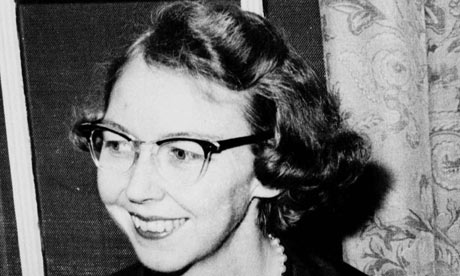Most of you probably don’t know that I’m working on a biography of Flannery O’Connor to be released in 2012. This will be part of Thomas Nelson’s Christian Encounters series of short biographies. (My 2010 Saint Patrick book is from the first round of the same series).
Flannery O’Connor, like me, was a Middle Georgian. She’s always been one of my favorite writers. But she’s more than a favorite writer; she is one of the twin poles of my writerly world, the other being John Milton.
I was in tenth or eleventh grade the first time I read Milton’s Paradise Lost. As they say in the romantic comedies, Milton had me from hello. His language soars so high, plunges so deep. Whole worlds opened up as I immersed myself in that strange music.
Milton’s language was foreign enough to stretch me, and his allusions were just obscure enough to make me long for the erudition required to enjoy Milton fully. My academic path was set: I wanted to know enough to understand Milton.
Readers of fantasy fiction talk about fantasy taking them to other worlds. That’s exactly what Paradise Lost did for me. I can’t say I mean that literally, exactly, but I do mean it more than metaphorically. I don’t quite know how to articulate this, but something about the foreignness of Milton’s language propelled me, for better or worse, beyond Middle Georgia’s gravitational pull.
My academic career was a journey away from home. Being a scholar is mostly a matter of talking smart—which is to say, talking less and less like I talked normally. As it turned out, I was a skilled enough linguist to pick up this second language quite easily. And as a specialist in Milton, I burned with an Anglophilia that was tinged with a disdain for American arts and letters. Twain was nice. Faulkner was brilliant. Can you imagine, I thought, what they could have been if only they spoke the Mother Tongue?
But if Milton took me to another world, Flannery O’Connor brought me home again (this was years after my academic career was over and I was again free to read what I wanted to read and like what I wanted to like). It was Flannery O’Connor who made me see the artistic power that inheres in my native tongue. I don’t just mean American English, or even Southern English, but Middle Georgia English.
There are turns of phrase in O’Connor’s stories (and even more in her letters) that I’ve heard all my life but never expected to see on a printed page. I’m not talking about local color. I’m talking about a writer giving voice to the deepest of truth in speech that is beautiful and soul-stirring, but not elevated. It’s earthy speech, O’Connor’s native tongue. And the fact that I share her native tongue has made a huge difference for me as a writer. It has given me tremendous confidence to know that my lived experience—the language, the people, the social dynamics, the landscapes—is the stuff of great art. I don’t make any particular claims for Middle Georgia. My native tongue is no better than anybody else’s. But to see what Flannery O’Connor did with it was a gift and a legacy.










Drew
There was a time I was reading and re-reading everything Flannery O’Connor wrote, to the point where my own writing began to take on an O’Connor-ish tone. (Should I be surprised that I still consider the things I wrote during that period my best writing?) There were a lot of authors I liked to read, but O’Connor compelled me to write.
The Habit of Being (the collection of her letters) is fantastic for the fact that her “native tongue” as you say absolutely shines. (And it also helped shed light on the ideas behind so many of her stories.)
Amy @ My Friend Amy
This is fantastic
Terri DeFoor
I am so excited to know that you are doing a biography on Flannery O’Connor! I first read some of her stories in a course at Mercer University, and I was immediately smitten. I have read many more of her stories, as well as a book of her letters and a biography by Brad Gooch. I’ve read about half of your biography on St. Patrick and am really enjoying it. But I am really looking forward to your take on O’Connor! (So now do I need to read Milton?)
S.D. Smith
This is inneresting (as we say in WV) because where I just begun to read Milton myself. OK, I’ll drop the local flavor.
I just read Paradise Lost for the first time. A-mazing. It’s one of those things where I’m surprised everyone didn’t quit writing after that.
Looking forward to your O’Connor book. At the risk of further relegating myself to the outside of the informed, I have yet to fully fall into the gentle grip Flannery O’Connor. I’ve read her a little, but so far am not carried away.
But, if it helps, I loved the movie “Hot Rod.”
Drew
Seems like everyone had to read “A Good Man is Hard to Find” in some literature course along the way. That or “Good Country People.”
But I’d recommend “Revelation” as one of her better ones.
Jonathan Rogers
Well, SD, I got a few things to say to you. First of all, I’m very glad to hear you’ve embarked on Milton. I think it will do you some good. Second, Flannery O’Connor’s grip aint gentle. Third, I don’t understand how you haven’t been carried away. The three stories that Drew named are probably my favorite three. I also love “Everything that Rises Must Converge.” And “The Enduring Chill.” There’s an audio file of Flannery O reading “A Good Man Is Hard to Find” that floats around the World Wide Interwebs; it seems to disappear, then pop up elsewhere. But it’s pretty remarkable to hear in her voice.
SD, what have you read of FO? I tend to point people to her short stories rather than her novels…if you get the short stories, you’ve gotten FO. I love the novel Wise Blood too (I like The Violent Bear It Away less), but the stories are the perfect format for her voice.